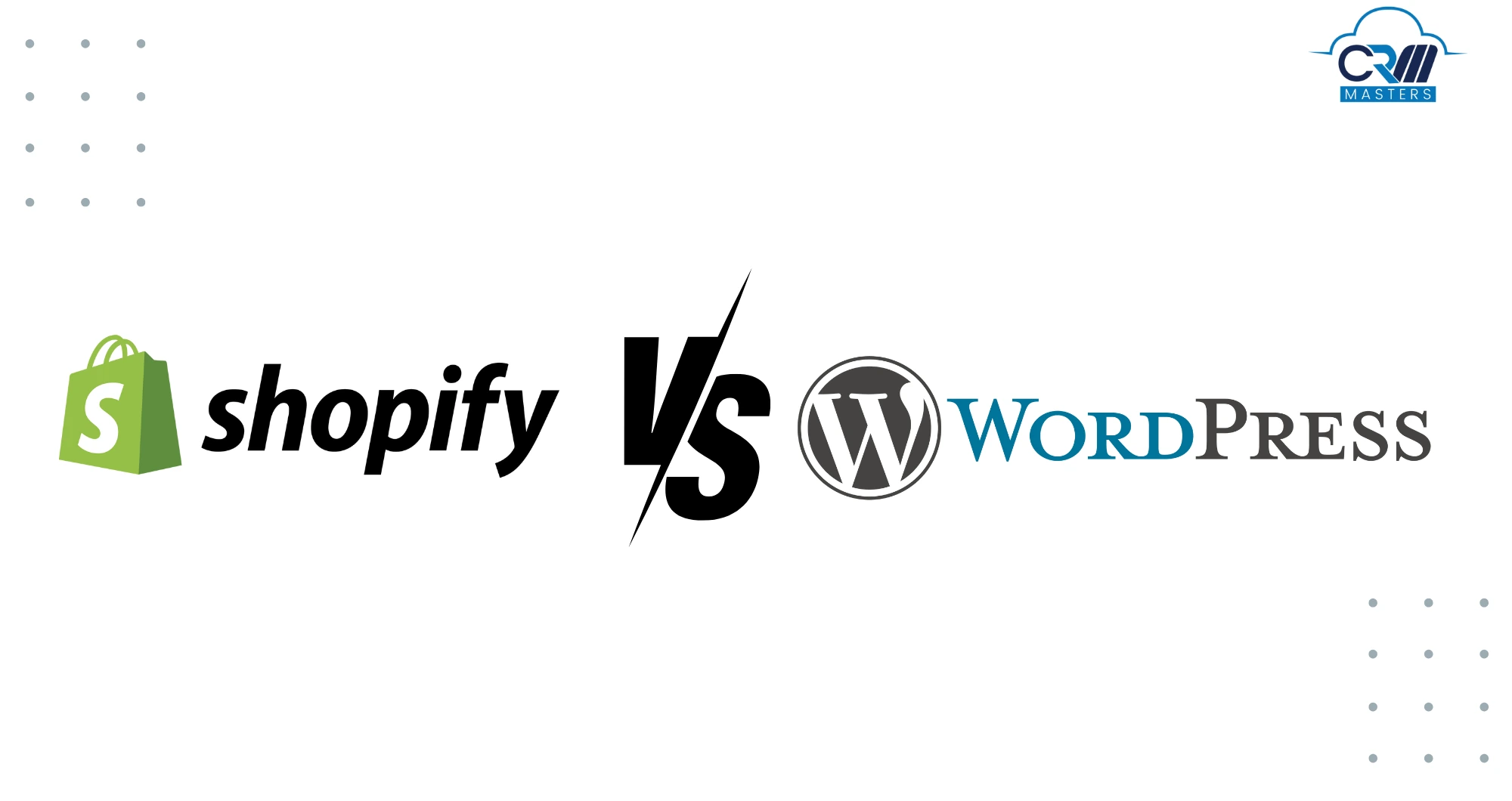
Shopify Vs WordPress: Which is Best for Your Business?
When starting an online business, one of the most crucial decisions you’ll face is choosing the right platform to build your website. Shopify and WordPress are two of the most popular choices for creating an online store. Both platforms offer unique features and advantages, but which is best suited to your business needs? In this blog post, we’ll compare Shopify vs WordPress, explore their benefits, and ultimately help you decide which is best for your eCommerce goals.
What is Shopify?
Shopify is a dedicated eCommerce platform designed to help businesses build and manage online stores. Unlike WordPress, Shopify focuses on providing an all-in-one solution for online sales, including hosting, payment processing, and security features.
Pros of Shopify:
1. Ease of Use

Shopify is incredibly user-friendly, with an intuitive drag-and-drop interface that makes it easy for non-technical users to create and manage an online store.
2. All-in-One Solution
Shopify provides an all-in-one solution with hosting, security, and software updates, so you don’t have to worry about the technical aspects of running an online store. This makes it ideal for small business owners who want to focus on growing their business without using technical details.
3. 24/7 Customer Support

Shopify provides 24×7 customer support via live chat, email, and phone, so you can get assistance whenever needed.
4. Ecommerce Features
Shopify has built-in features like inventory management, customer accounts, and a secure checkout process. You can also access various apps to enhance your store’s functionality.
Disadvantages of Shopify
1. Less Customization
While Shopify offers many themes and apps, it doesn’t provide the same level of customization as WordPress. You may need to hire a developer if you want a highly customized design or functionality.
What is WordPress?
WordPress is an open-source content management system (CMS) initially designed for blogging, but it has evolved into a powerful platform for building any website.
Pros of WordPress:
1. Highly Customizable
With thousands of plugins and themes available, you can add virtually any functionality or design element to your WordPress website. This flexibility makes it an excellent choice for businesses that want complete control over their site’s design and features.
2. SEO Friendly
WordPress is well-optimized for SEO right out of the box, and numerous plugins like Yoast SEO allow you further to enhance your site’s visibility in search engines.
3. Flexibility
WordPress is well-optimized for SEO right out of the box, and numerous plugins like Yoast SEO allow you further to enhance your site’s visibility in search engines.
Cons of WordPress:
1. Requires More Maintenance:
Since WordPress is a self-hosted platform, you must manage plugins, themes, and security updates.
2. Can Be Complex for Beginners:
Although it offers great flexibility, WordPress can be overwhelming for newcomers, especially when setting up an eCommerce store.
Comparison of Features: Shopify vs WordPress
1. Ease of Use
Shopify is a user-friendly platform specifically built for eCommerce. With its drag-and-drop interface, you can set up and manage your store without technical knowledge. The setup process is streamlined, meaning even business owners with no web design experience can launch a professional online store quickly.
While WordPress is also user-friendly, setting up an eCommerce store requires additional plugins (like WooCommerce), and there is a learning curve. You’ll also need to choose a hosting provider, install software, and manage updates yourself.
2. All-in-One eCommerce Solution
Shopify is an all-in-one eCommerce platform that handles everything for you. It includes secure hosting, payment gateways, SSL certificates, and automatic software updates. Shopify’s comprehensive ecosystem allows you to focus solely on your business, not technical setup or maintenance.
While WordPress can power eCommerce with plugins like WooCommerce, it doesn’t include these built-in features. You’ll need to find a hosting provider, manage security, and install various plugins to ensure your store runs smoothly.
3. Security & Maintenance
Shopify provides automatic updates and high-level security features, including SSL encryption and PCI compliance, in the subscription fee. This ensures your store and customer data are always secure without manual intervention.
Security on WordPress depends on the plugins and hosting provider you choose. While WordPress offers security plugins, you must regularly update software, plugins, and themes to avoid vulnerabilities.
4. Scalability
Shopify is designed to grow your business. Whether you’re a small startup or a large enterprise, Shopify’s pricing plans and infrastructure allow for seamless scalability. As you grow, you can upgrade your plan and integrate with advanced features like multi-channel selling, advanced analytics, and international shipping.
WordPress can also scale, but it requires additional management. As your store grows, you must manually upgrade hosting, optimize performance, and implement more robust plugins to handle increased traffic or sales volume.
5. Payment Processing
Shopify has built-in payment gateways that make accepting credit cards, PayPal, and Apple Pay more manageable. Shopify Payments is integrated with the platform, meaning you don’t need to sign up with third-party payment processors unless you choose to.
With WordPress, you must configure your payment processing system through plugins like Zoho Commerce, WooCommerce and integrate with third-party gateways (e.g., PayPal, Stripe). This setup can be more time-consuming and complex.
6. Design & Customization
Shopify offers a variety of professional eCommerce themes that are easy to customize using a drag-and-drop builder. While the design flexibility is good, it’s more limited than WordPress in terms of layout and customization.
WordPress is highly customizable, and with access to thousands of themes and plugins, you have more control over your website’s design. If you have coding skills, WordPress allows for complete flexibility in design.
7. SEO Features
Shopify offers built-in SEO features, including customizable meta and title tags and easy integration with Google Search Console. Shopify also automatically generates a sitemap for your store, helping Google index your site effectively.
WordPress has more advanced SEO control, especially with plugins like Yoast SEO. If SEO is a primary focus for your business, WordPress offers finer control over page structure, keywords, and advanced optimization.
8. App Integrations
Shopify provides a wide range of apps (over 3,000) in its app store, offering easy integration for marketing, shipping, inventory management, and much more. These apps make it simple to add new functionality to your store without needing to hire developers.
WordPress has plugins, but many require manual installation and configuration. While there are a ton of options available, the integration process is often more involved than Shopify’s one-click installation.
Also Read:- Why integrate third party apps in Shopify
Conclusion: Which Is Best for Your Business?
While WordPress is a flexible platform that can be customized to meet various business needs, Shopify excels in areas crucial for running a successful eCommerce store. As an all-in-one, secure, scalable, and easy-to-use platform, Shopify provides a streamlined experience for entrepreneurs who want to focus on growing their businesses without any technical tasks.
As a Shopify Partner, CRM Master’s Infotech understand the unique needs of online store owners and are here to help you every step of the way, from setting up your Shopify store to optimizing it for conversions.
Contact us now if you’re ready to launch your eCommerce business with an easy, reliable, and robust platform!












